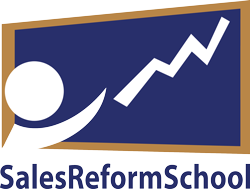A friend of mine, Let’s call him Joe, asked me to get together with him for breakfast last week. I had a feeling this was going to be a coaching breakfast. I know Joe through another business contact and talking shop mostly frames our relationship. That’s okay – I like Joe. He has a wonderfully sunny disposition and lives a life different from mine – certainly the ingredients for an enjoyable morning.
Generally speaking, Joe sells financial products for a wholesaler to small financial advisers. In a sense, he has a bunch of “products” on his truck that his market needs. His niche of small investment advisors reside mostly outside of major metropolitan areas. These advisers don’t get direct attention from the big financial institutions, so they need the education, attention, and breadth of products that Joe’s firm provides.
Sure enough after swapping catch-up stories about our wives and kids, lifestyles, etc. I asked Joe, “So, how’s biz? What’s going on?”
Joe’s response was typical Joe. Joe’s is a warm and optimistic soul. He’s passionate and eager to please.
“It’s going great. In some respects, my numbers are terrific. My team is great and I love the company I’m working for. I’ve got a full schedule of appointments, face-to-face meetings this week, with a good mix of existing and potential new clients.”
I let him sit, marinating on his comments. I didn’t say a word, because I knew what was coming next.
“But, I’ve GOT to start closing more cases. That’s what we call it when insurance opportunities go to underwriting or offers for our other financial products go to agreement.”
 Once again: Lots of at-bats, not a lot of hits. I’ve heard this lament in every industry I’ve worked with – tech, consulting, home services, travel, home remodeling, software, industrial products, etc. Usually, it’s a sales rep or an executive asking how to improve the seller’s batting average.
Once again: Lots of at-bats, not a lot of hits. I’ve heard this lament in every industry I’ve worked with – tech, consulting, home services, travel, home remodeling, software, industrial products, etc. Usually, it’s a sales rep or an executive asking how to improve the seller’s batting average.
So, I asked Joe to go through these initial meetings, what’s going on exactly inside of those meetings with financial advisors?
Generally, it seemed the “agenda post facto” went something like this:
- Rapport building about the drive down, the weather, something cool about the town or office building, hometown, etc.
- Canned intro into Joe’s company and what they provide
- “If you can take a little time, maybe we can see if any of our products are appropriate for your ‘Book”” (A “book”, is the financial advisers customer list.)
- Offer to provide a tool/calculator that figures out if there are matches between Joe’s products and clients in the Book.
- Response from the advisor: “Thanks for coming down, I’ll think about it.”
Joe then admitted that he struggles with “The Ask” or the result that he is looking for out of the meeting. That is, what exactly should he be going for in this meeting?
I saw two areas for improvement. Remember Joe’s prospect conversations are not cold calls; the advisor has invited Joe to the office for a meeting.
First, I suggested that Joe stop teaching and start asking.
Joe’s products broadly solve three challenges a financial advisor often is asked by, or suggests to his high net worth clients. Joe can lay these three out in expert fashion. The only way Joe makes money is for someone to match up clients (end-users) with at least one of three challenges, provide a product and write a contract.
So, I poked Joe: Why aren’t you laying your cards out on the table early and confidently? Something like this:
“I’m willing to bet you are in a similar position as our other advisor-clients – your book includes clients who should be worried about at least one of these three areas. My goal today is for us together to pinpoint individuals in your book for whom my products would be appropriate. How do we accomplish that?”
And then STOP TALKING. The advisor will then qualify or disqualify himself as worthy of your time.
In suggesting this tack, I’m borrowing heavily from two sources with my suggested language:
- Simon Sinek’s Starting with Why. Let’s be totally clear on these sales calls about your intention and objective. Let’s not beat around the bush and allow anyone to think that the relationship is more important than you you both accomplishing your purposes. This language clearly shows in the beginning or at least very early (the start) WHY you are schlepping to all these small offices in small southeastern cities.
- We know from The Challenger Sale, that the most successful sales people do a few things very well. Focusing on one particular thing for Joe’s purpose: They take control of the sales cycle. Joe shouldn’t wait for the advisor to find the time to call Joe up and ask for help identifying candidate clients for Joe’s products. Or wait for the advisor to have a client call and slap his forehead, “Eureka, I need to call Joe.” No, he should ask in no uncertain terms how the two of them can go about parsing “the book” looking for clients who would be well served with Joe’s products.
If the advisor doesn’t leap at the request to review “the book”, Joe should politely ask, “Why not? And if you need help, we – you and me – can use this tool my firm created to make it easy for you. We’ve been helping advisors like you help their clients for 12 years, how do we get started?” This is taking control of the sales process by asking direct peer-to-peer questions.
The peer-to-peer comment is clue to my next suggestion relating to taking control of the sales process. I told Joe that he comes off as such a nice guy in person, that his language often fails him. Too often, when I asked him to role play with me like he does in meetings, I heard this, or something close:
Maybe, we can spend a little bit of time going over your book?
Perhaps, we have some products that can help?
Might we talk about your client base?
Joe is already such a nice guy with a great disposition and speaking style, his words like those above in bold, undermine his intentions. They give power over to his prospects and give them an out.
Maybe, maybe not.
Perhaps, perhaps not.
A little bit, can I please have some of your precious time?
Instead, Joe should set up his message as a best practice and assume the advisor wants to follow him.
How should we go over your book against our three product areas?
Which product group of mine is most appropriate for your book?
Do you want to talk about your client base now or schedule another time?
This is borrowing heavily from the transactional analysis model from psychology. If you use weak language you are putting yourself in the child position and elevating the prospect to parent. Instead use strong language and at least achieve adult-adult communication. This way your market will treat you with the respect you deserve as equals.
So, Joe left breakfast fortified with a couple key ideas and some scripting to hold actionable conversations. I’m looking forward to hearing about his higher batting average.
